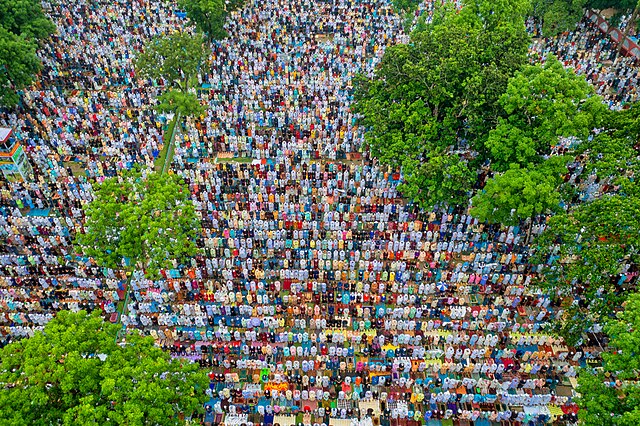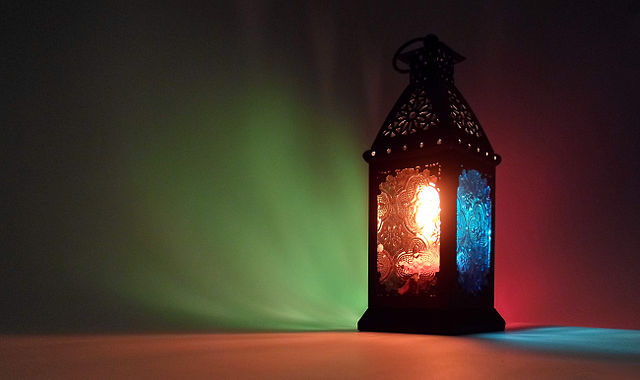Loading AI tools
Holidays in Islam From Wikipedia, the free encyclopedia
There are two main holidays in Islam that are celebrated by Muslims worldwide: Eid al-Fitr and Eid al-Adha. The timing of both holidays are set by the lunar Islamic calendar, which is based upon the cycle of the moon, and so is different from the more common, European, solar-based Gregorian calendar. Every year, the Gregorian dates of the Islamic holidays change.

Both Eid al-Fitr and Eid al-Adha follow a period of 10 holy days or nights: the last 10 nights of Ramadan for Eid al-Fitr, and the first 10 days of Dhu al-Hijjah for Eid al-Adha. The Night of Power (Arabic: لیلة القدر, romanized: Laylat al-Qadr), one of the last 10 nights of Ramadan, is the holiest night of the year.[citation needed] Conversely, the Day of Arafah, the day before Eid al-Adha, is the holiest day of the Islamic year.[citation needed]
There are a number of other days of note as well as festivals, some common to all Muslims, others specific to Shia Islam or branches thereof.
Additionally, Friday is considered the holiest day of the week, and in Islamic tradition, is considered a celebration in itself. Friday Prayers (Juma) are congregational prayers held in mosques, and Muslims are encouraged to wear clean and refined clothes, perfume, and bathe. It is customary to eat special meals with family on this day.
Eid al-Fitr is celebrated at the end of Ramadan (a month of fasting during daylight hours), and Muslims may perform acts of zakat (charity) on the occasion, which begins after the new moon is sighted for the beginning of the month of Shawwal. Celebration begins with prayers on the morning of 1 Shawwal, followed by breakfast, and often celebratory meals throughout the day.
Eid al-Adha is celebrated on the tenth day of Dhu al-Hijjah, when the Hajj pilgrimage takes place which lasts for four days. Muslims may perform an act of zakat and friendship by slaughtering a sheep or cow and distributing the meat to family, friends, and the poor. Muslims are also encouraged to be especially friendly and reach out to one another during this period.[1]

Muslims celebrate when they believe the Quran was first revealed to Muhammed by fasting from dawn to sunset during Ramadan, the ninth month of the Islamic calendar.[2] Fasting is considered a purifying experience so that Muslims can gain compassion and deepen their faith in God.[3] Those with certain health conditions such as diabetes, and children are exempt from fasting. Travelers, and women who are menstruating or nursing a baby, are exempt from fasting but are required to fast later.[citation needed]
The Islamic calendar is based on the synodic period of the Moon's revolution around the Earth, approximately 291⁄2 days. The Islamic calendar alternates months of 29 and 30 days (which begin with the new moon). Twelve of these months make up an Islamic year, which is 11 days shorter than the Gregorian year. Some Gregorian dates may vary slightly from those given, and may also vary by country. See Islamic calendar.[4][5][6]
| Holiday name | Hijri date | 1445 AH | 1446 AH |
|---|---|---|---|
| Islamic New Year | 1 Muḥarram | 19 July 2023 | 7 July 2024 |
| Ashura | 10 Muḥarram | 28 July 2023 | 17 July 2024 |
| Arbaʽeen[lower-alpha 1] | 20 or 21 Ṣafar[lower-alpha 2] | 6 Sep. 2023 | 26 Aug. 2024 |
| Akhiri Chahar Shambah[lower-alpha 3] | Last Wednesday of Ṣafar | ||
| Eid-e-Shuja' (Eid-e-Zahra)[lower-alpha 4] | 9 Rabī‘ al-Awwal | 24 Sep. 2023 | |
| Mawlid an-Nabī (Birthday of Muhammad)[lower-alpha 5] | 12 Rabī‘ al-Awwal | 27 Sep. 2023 | 15 Sep. 2024 |
| Baptism of Muhammad[lower-alpha 6] | 19 Rabī‘ al-Awwal | 4 Oct. 2023 | 22 Sep. 2024 |
| Beginning the Three Holy Months | 1 Rajab | 13 January 2024 | |
| Laylat al-Raghaib | 2 Rajab | 14 January 2024 | |
| Birthday of ‘Alī ibn Abī Ṭālib[lower-alpha 1] | 13 Rajab | 25 Jan. 2024 | |
| Laylat al-Mi'raj | 26 Rajab or 27 Rajab[lower-alpha 7] | 7-8 Feb. 2024 | |
| Laylat al-Bara'at | 15 Sha‘bān | 25 Feb. 2024 | |
| Birthday of Hujjat-Allah al-Mahdī[lower-alpha 4] | 15 Sha‘bān | 25 Feb. 2024 | |
| First day of Ramaḍān | 1 Ramaḍān | 11 Mar. 2024 | |
| Laylat al-Qadr | 21, 23, 25, 27, or 29 Ramaḍān[lower-alpha 8] | between 29 Mar. & 8 Apr. 2024 |
|
| Chaand Raat[lower-alpha 9] | 29 or 30 Ramaḍān[lower-alpha 10] | 9 Apr. 2024 | |
| Eid al-Fitr | 1 Shawwāl | 10 Apr. 2024 | 30 March 2025 |
| Hajj | 8–13 Dhū al-Ḥijja | 14–19 June 2024 | |
| Day of Arafah | 9 Dhū al-Ḥijja | 15 June 2024 | 5 June 2025 |
| Eid al-Adha | 10 Dhū al-Ḥijja | 16 June 2024 | 6 June 2025 |
| Eid al-Ghadeer[lower-alpha 1] | 18 Dhū al-Ḥijja | 24 June 2024 | |
| Eid al-Mubahalah[lower-alpha 1] | 24 Dhū al-Ḥijja | 30 June 2024 |
Seamless Wikipedia browsing. On steroids.
Every time you click a link to Wikipedia, Wiktionary or Wikiquote in your browser's search results, it will show the modern Wikiwand interface.
Wikiwand extension is a five stars, simple, with minimum permission required to keep your browsing private, safe and transparent.